Related Research Articles
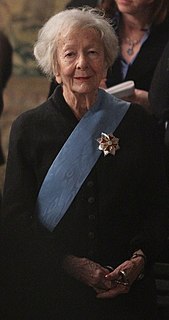
Maria Wisława Anna Szymborska was a Polish poet, essayist, translator and recipient of the 1996 Nobel Prize in Literature. Born in Prowent, which has since become part of Kórnik, she later resided in Kraków until the end of her life. In Poland, Szymborska's books have reached sales rivaling prominent prose authors: although she once remarked in a poem, "Some Like Poetry", that no more than two out of a thousand people care for the art.

Adam Mickiewicz University in Poznań is one of the major Polish universities, located in the city of Poznań, Greater Poland, in the west of the country. It traces its origins to 1611 and officially opened on May 7, 1919. Since 1955, it has carried the name of the Polish Romantic poet Adam Mickiewicz. The university has been frequently listed as a top three university in the country.
Walter Whipple is a Teaching Professor Emeritus of Polish in the Department of Germanic and Slavic Languages of Brigham Young University (BYU) in Provo, Utah. From 1990 to 1993, Whipple served as the president of the Poland Warsaw Mission of The Church of Jesus Christ of Latter-day Saints.
Ludwika Wawrzyńska was a Polish teacher who worked at an elementary school in Warsaw. On February 8, 1955 she rescued four children from a burning house where they had been locked by their parents as they were leaving for work. She died ten days later, on February 18, from severe burns.
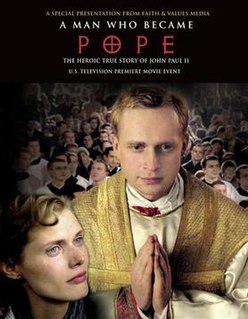
Karol: A Man Who Became Pope is a 2005 TV miniseries written and directed by Giacomo Battiato, and created as a Polish-Italian-French-German and Canadian joint cooperation project. Karol is a biography of Karol Wojtyła, later known as Pope John Paul II, beginning in 1939 when Karol was only 19 years old and ending at the Papal conclave, October 1978 that made him Pope.
"Black Coffee" is a song with music by Sonny Burke and words by Paul Francis Webster. The song was published in 1948.
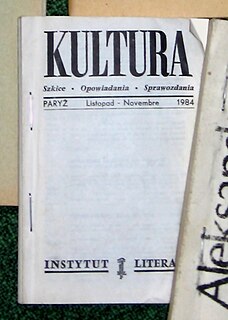
Kultura —sometimes referred to as Kultura Paryska —was a leading Polish-émigré literary-political magazine, published from 1947 to 2000 by Instytut Literacki, initially in Rome, then Paris.

Kórnik is a town with about 6,800 inhabitants (2006), located in western Poland, about 25 kilometres (16 mi) south-east of the city of Poznań. It is one of the major tourist attractions of the Wielkopolska region and the Greater Poland Voivodeship because of the historical castle and arboretum, which is amongst the oldest and richest collections of trees and shrubs in Poland.
Polish poetry has a centuries-old history, similar to the Polish literature.

Wydawnictwo Literackie is a Kraków-based Polish publishing house. Since its foundation in 1953, Wydawnictwo Literackie has been focused on publishing modern prose and poetry by both renown and emerging authors, both Polish and foreign. In recent years it is primarily associated with editions of Polish language classics of the 20th century and of modern science-fiction novels. In recent years the publishing house also expanded into the market of textbooks for humanities, lexicons and dictionaries.
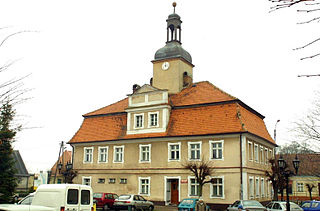
Bnin is part of the town of Kórnik, south-east of the city of Poznań, in Greater Poland Voivodeship in western Poland, between Lake Kórnickie and Lake Bnińskie. From 1395-1934, Bnin was a town in its own right. It became part of Kórnik in 1961.

Patrycja Soliman is an Egyptian-born Polish film and stage actress.
Twórczość is a Polish monthly literary journal, first published in 1945. Since 1 April 2000, Twórczość has been published by the state-funded Book Institute. It publishes poetry, fiction and literary criticism.
Adam Włodek was a Polish poet, editor and translator.
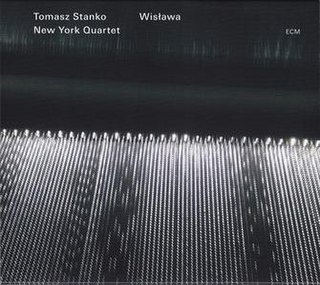
Wisława is an album by Polish jazz trumpeter and composer Tomasz Stańko's New York Quartet. Dedicated to poet and Nobel Prize-winner Wisława Szymborska, the album was recorded in 2012 and released on the ECM label the following year.

Clare Cavanagh is an American literary critic, a Slavist, and a translator. She is the Frances Hooper Professor in the Arts and Humanities and Chair of the Department of Slavic Languages and Literatures at Northwestern University. An acclaimed translator of contemporary Polish poetry, she is currently under contract to write the authorized biography of Czesław Miłosz. She holds a B.A from the University of California, Santa Cruz, and an M.A. and Ph.D from Harvard University. Before coming to Northwestern University, she taught at the University of Wisconsin, Madison. Her work has been translated into Russian, Polish, Hungarian, French, Dutch, Chinese, and Japanese.
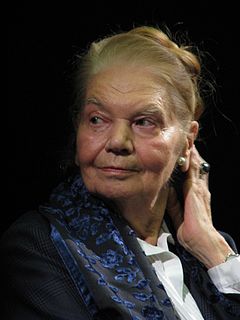
Julia Hartwig was a Polish writer, poet and translator, considered to be one of Poland's most important female poets.
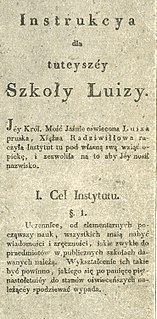
Luisenschule was a female school, open in Posen in the years of 1830-1919. Until 1873 it was operated as a private establishment, managed by the Luisenstiftung foundation; afterwards it was incorporated into the official Prussian education system. Its prestigious character attracted girls from high- and mid-range bourgeoisie; the school was particularly recognized for teaching music and arts in general. Since 1841 Luisenschule operated jointly with Lehrerinnen-Seminar, teachers’ training courses. The school was designed as a German-Polish institution, though since the mid-19th century the Polish ingredient went into decline; by the end of the century Luisenschule pursued a militantly patriotic Prussian education model. Periodically the Jews formed a significant fraction of the girls. Luisenschule students who became public figures in the realm of German politics and arts were Auguste Schmidt, Ida Barber, Elise Ekke und Margarete Gerhardt. The best known Polish graduate was Walentyna Motty, later wife of Hipolit Cegielski.
The Wisława Szymborska Award is a Polish annual international literature prize presented by the Wisława Szymborska Foundation. It was established in 2013, and was named in honour of the Nobel Prize-winning poet Wisława Szymborska (1923-2012). It is awarded to authors of best poetry works published the previous year. Both books written in Polish and translated into Polish are eligible for the award and can be submitted by the authors themselves, publishing houses, cultural institutions as well as members of the award committee. The award carries a cash prize of PLN 200,000 ($50,000) for the winner and PLN 50,000 ($15,000) for the translator, which makes it one of the most valued literary prizes in Poland.
References
- ↑ "Female Polish Names". 20 000 Names. Retrieved 15 September 2018.